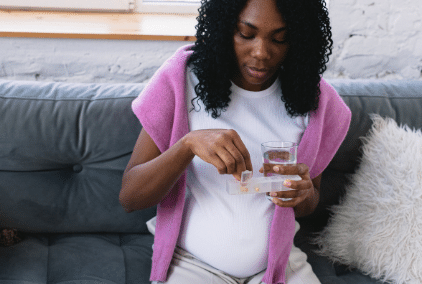
Most substances, like alcohol and medications, are not recommended during pregnancy as they can pass through the placenta to the baby. They may affect the growth and development of the unborn baby. But what happens if the expectant mother has a bacterial infection? Is it okay for her to take regular antibiotics like while pregnant? In fact, how safe is Ampiclox in pregnancy?
Pregnancy can cause a lot of changes in the body. It can lower the immune system, causing the mother to be more vulnerable to infections.
Some infections may be benign and harmless, while others may be harmful, and if left untreated, they can be fatal to both the mother and her unborn baby. Doctors prescribe antibiotics for treating infection during pregnancy only when necessary, as they not only treat infections but also kill good bacteria.
Ask a Doctor on KompleteCare before taking any medication.

Antibiotics are medications used for treating bacterial infections. Reports have shown that almost 80% of the medication prescribed to pregnant women is antibiotics. Untreated bacterial infections have been linked to pregnancy complications such as:
Common bacterial infections that can affect the mother, the pregnancy, and the baby even after delivery include:

The answer is no. Not all antibiotics are safe for pregnant mothers. The safety of taking an antibiotic while pregnant depends on:
Some antibiotics are unsafe and not recommended to be used during the entire period of pregnancy, while others are not recommended to be used during early pregnancy or towards the end of the pregnancy.
Taking some antibiotics while pregnant may have short-term or long-term effects on the baby. They can increase the risk of:

To help determine if an antibiotic is safe to take while pregnant, the U.S. Food and Drugs Administration (FDA), grouped medications (antibiotics included) into different categories based on their potential to pose a risk to the unborn child. The categories are:
Studies in pregnant women have revealed that these drugs are safe and can be taken at any stage of pregnancy, and they do not pose any risk of fetal abnormalities to the unborn baby.
There is no adequate and well-controlled human research on the use of these medicines. However, they are believed to be safe for the pregnant, as animal studies have not shown that these drugs can pose any harm to the fetus.
They may not be safe to use while pregnant. The result of animal studies has shown an adverse effect of their use on the fetus, or there are no animal studies and no well-controlled studies of their use in humans.
They should never be taken while pregnant. Studies in pregnant women have revealed positive evidence of the risk of these drugs to the fetus. Medicines in this category can only be used while pregnant in cases where the benefits outweigh the risks.
Studies have revealed evidence of the risk of these drugs to the fetus and the risk clearly outweighs any benefit they may have.
Antibiotics that are safe to be taken while pregnant are those in categories A and B and they include:
Category D antibiotics include tetracyclines and sulfonamides. They are among the antibiotics believed to be unsafe during pregnancy. Tetracyclines can affect bone formation and discolor a developing baby’s teeth.
While sulfonamides might increase the risk of heart conditions, cleft lip or palate, and jaundice in babies. Tetracyclines are not recommended after the fifth week of pregnancy, and sulfonamides are not recommended during the first and last trimesters of pregnancy.
Ampiclox is an antibiotic medication that contains a mix of ampicillin and cloxacillin as its active ingredients. Both ampicillin and cloxacillin belong to the class of antibiotics known as penicillin. They work by preventing the growth and reproduction of bacteria.
Ampiclox is a broad-spectrum antibiotic usually prescribed for various bacterial infections such as urinary tract infections, skin and soft tissue infections, respiratory tract infections, meningitis, stomach and intestine infections, and gonorrhea. Ampilox is available as a suspension, tablet, capsule, and injection. It can be taken orally or injected into a vein or muscle.
Ampiclox belongs to the category B classification for pregnancy by the U.S. Food and Drug Administration (FDA). It can safely be used in pregnancy, as animal studies have not revealed any adverse effects of its use on the fetus.
Also, no evidence suggests that taking Ampiclox while pregnant can cause birth defects or result in stillbirth, low birth weight, preterm labor, or learning or behavioral problems in babies.
It is safe to treat bacterial infections with Ampiclox while pregnant, as no evidence proves or suggests that it can pose a risk to the unborn baby. However, since it has its own side effects and contraindications, get the go-ahead of a licensed doctor if you are pregnant or allergic to any of the ingredients in Ampiclox and report any side effects. It is best to stick to your doctor’s instructions on the dose and how long you are to take the antibiotics. Remember to also ensure that you complete the entire course of treatment as incomplete treatment may result in antibiotic resistance.
healthcareNovember 7, 2024
MedicationNovember 25, 2024
NutritionFebruary 5, 2025
MedicationFebruary 5, 2025








